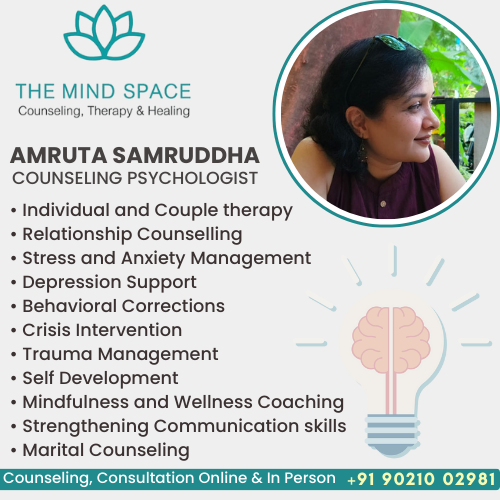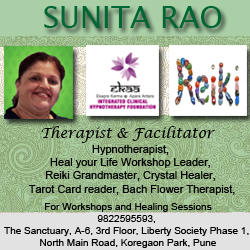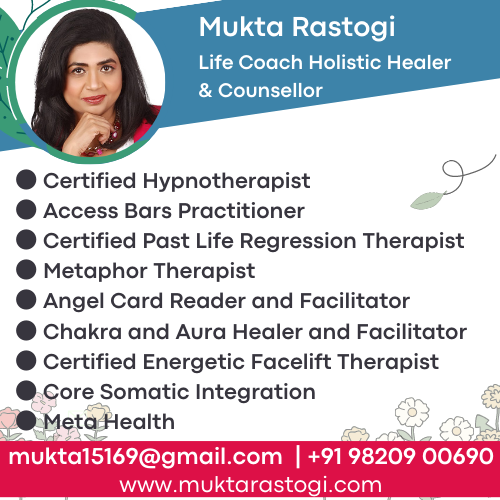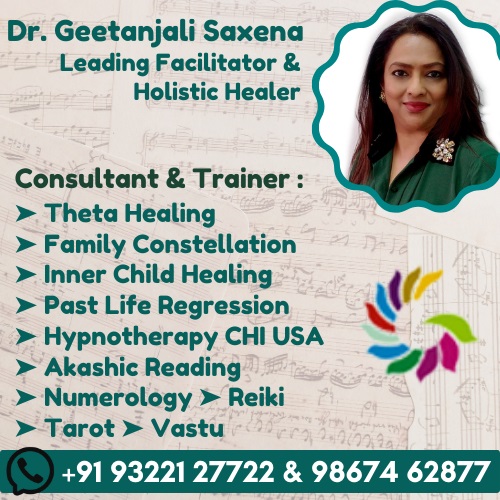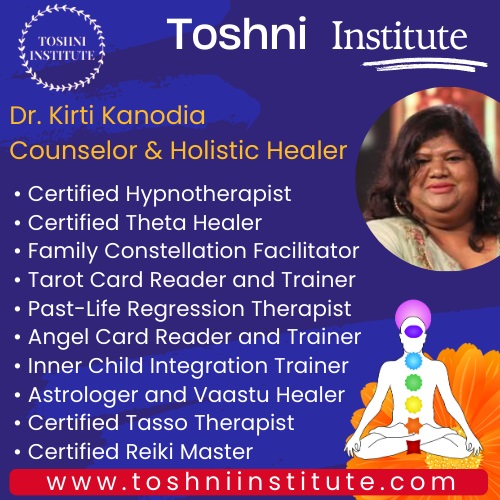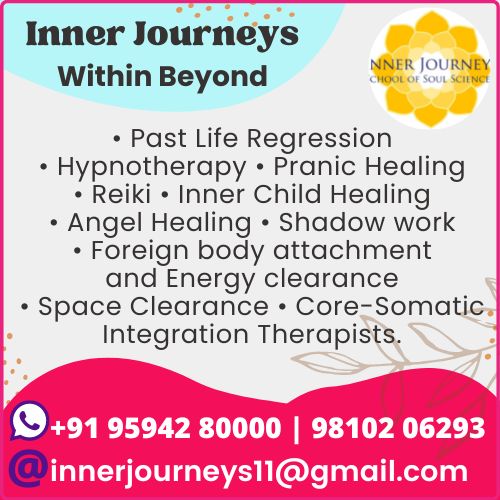Alternative Therapies
- Alternative Medicine
- Access Bars
- Access Body Processes
- Access Consciousness
- Access Energetic Faclift
- Acupressure
- Acupuncture
- Angel Healing
- Aromatherapy
- Aura Reading
- Ayurveda
- Bach Flower Remedies
- Breathwork
- Chakra Healing
- Cosmetic Acupuncture
- Crystal Healing
- Cupping Therapy
- Emotional Freedom Technique (EFT)
- Ergonomics
- Fengshui
- Geopathic Stress
- Face Reading
- Graphology
- Heal Your Life
- Holistic Solutions
- Holy Fire Reiki
- Homeopathy
- Ho'oponopono
- Hoodoo
- Hypnotherapy
- Inner Child Therapy
- Jesus Reiki
- Jikiden Reiki
- Law of Attraction
- Manual Therapy
- Meditation
- Melchizedek Method
- Motivational Counseling
- Mudra Healing
- Nakshatra Energies
- Naturopathy
- Neuro Linguistic Programming (NLP)
- Numerology
- Panchakarma (Ayurveda)
- Past Life Regression
- Physiotherapy
- Pranic Healing
- Pyramids
- Reiki
- Rudraksh
- Shamanic Healing
- Sound Healing
- Silva Mind Control Method
- Sujok therapy
- Tarot
- Theta Healing
- Unani Medicine
- Yoga
- Wicca
- Womb Healing
Diseases & Conditions
- Acne & Pimples
- Allergies
- Arthritis
- Asthma
- Behavioural Disorders
- Dandruff
- Diabetes
- Emotional Problems
- Gallstones
- Gastritis
- Hairloss
- Heart Diseases
- Hormonal Problems
- Hypertension
- Immune Disorders
- Infections
- Infertility
- Jaundice
- Kidney Disorders
- Liver Disorders
- Menstrual Disorders
- Migraine
- Neck & Back Pain
- Obesity
- Osteoporosis
- Peptic Ulcer
- Prevention
- Prostate Problems
- Psoriasis
- Sexual Dysfunctions
- Sinusitis
- Sleep Disorders
- Skin Diseases
- Stress
- Thyroid Disorders
- Ulcerative Colitis
- Urinary Infections
General Wellness
Best Teen Counselling Therapy In Pune
The Mind Matters - Ms. Amruta Samruddha

Amruta Samruddha is a passionate Counseling Psychologist with years of experience in practice in providing therapeutic Interventions and assessments to Individuals seeking personal growth and emotional well-being

Sarayu Healing Center - Ms. Sunita Rao
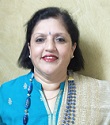
In her pursuit of finding better ways to heal the human body, mind and spirit Sunita Rao has been certified by internationally renowned organizations such as the EKAA School of Integrated Clinical Hypnotherapy and Heal Your Life based on the philosophy of Louise L Hays. She is also a Reiki Grandmaster Practicing and initiating in the Usui system of Reiki..


Ms. Mukta Rastogi
Mukta Rastogi is a Life coach, Counsellor, Certified Hypnotherapist, Access Bars Practioner, Certified with Dr Brain Weiss in Past Life Regression, trained in Metaphor Therapy and Angel Card Reader. She is Proactive and dynamic spiritual healer.

Abhay Thakkar
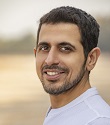
Abhay Thakkar, is the only one in India to provide NLP (Classic Code NLP) as well as New Code NLP which are internationally recognized and certified by the co-creator of NLP and New Code NLP - John Grinder and...

Dr. Geetanjali Saxena.

Past life Regression Trainer, Family Constellation Trainer, Theta Healing Trainer, Inner Child Work, Angel Therapist, Reiki healer, Hypnotherapy, Crystal Healing, Graphology, Tarot card reader & Astrologer

Dr. Kirti Kanodia

Kirti Kanodia is a certified Theta Healer, Trained Family Constellation Facilitator, Tarot card Reader, Past life Regression Therapist, Angel card reader, Inner child integration, Astrologer, Tasso Therapist and Reiki Master.

Inner Journeys
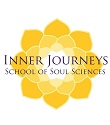
A Certified Past Life Regression Therapist, Healer, psychic and channel, who has been working in the field of channelled spiritual direction since ...

Teenage Depression Counselling
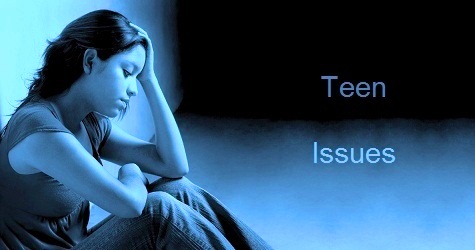
Psychologists, counsellors & therapists for online counselling help teenagers or adolescents to deal with their emotions.
Young people have to work through a broad range of issues as they move from childhood to adulthood. They may have to deal with changes to their bodies and their feelings and they may be thinking about having their first relationship or having sex.
Young people may also be exploring their identities in terms of their sexuality or gender identity. They may want more independence from their families, and their friends may play a more important part in their lives. Some may also want to experiment with alcohol and other drugs.
Although growing up can be an exciting time, it can also be confusing and challenging. Research shows confident young people who feel supported by their families and friends are more likely to safely negotiate issues like these. However, it is important to remember adolescence is generally a time for experimenting with risky behaviours, even with good parenting and role modelling.
Teenagers and alcohol
Alcohol is one of the most widely used by teens in India.
For young people, alcohol use is associated with a range of health risks, including:
Teenagers and body image
Young people are at risk of developing a negative body image, where they dislike the way they look.
The related health problems for young people can include:
- crash dieting and malnourishment
- eating disorders, including anorexia and bulimia nervosa
- obesity
- steroid use (to build muscle mass).
Teenagers and bullying
Estimates suggest around one in six children are bullied every few weeks or more in India.
Young people are bullied by their peers for many reasons, including:
- the way they look (for example, if they are overweight)
- resisting pressure to conform
- their cultural or socioeconomic background or religion
- their academic achievements
- their sexual orientation or behaviour
- being ?the new kid' at school.
Teenagers and smoking
Despite widespread media campaigns, tobacco smoking is still popular among young people in India, especially young women, though the number of young people who smoke cigarettes is decreasing.
Smoking tobacco increases people's risk of:
- cancers of the lung, throat and mouth
- reduced lung function
- asthma and other respiratory problems
- damaged senses of smell and taste
- heart disease, major heart attack and stroke.
Teenagers and family life
Young people can face issues relating to family life, including:
- relationship problems between family members
- family violence
- abuse, including neglect and physical, sexual or emotional abuse
- separation and divorce.
For some young people, a change in family circumstances can be positive. For example, if there has been a lot of conflict in a family, separation may be a better option.
Teenagers and illicit drugs
Marijuana (Cannabis sativa) is an illicit drug commonly used by young people. Around 17 per cent of year 10-12 students and around 14 per cent of 14-19 year olds have used cannabis at least once. Other commonly used illicit drugs include hallucinogens, amphetamines, cocaine and ecstasy, with very small percentages of 12 to 17 year olds having used one of these at least once.
It is often assumed that young people turn to illicit drugs to ease depression or anxiety, but most try drugs simply for fun. Young men are more likely than young women to experiment with illicit drugs. Those who smoke tobacco and drink alcohol are also more likely to try illicit drugs than those who do not.
Teenagers and media
Media, including print, television, film and online, can negatively affect young people in many ways, including:
- exposing them to extreme violence, which can desensitise them to reality
- supporting the cultural ideal that only thin is beautiful, which promotes body image problems
- reinforcing the importance of money, consumerism and status symbols.
Teenagers and suicide
Suicide is one of the most common cause of death among young people in India. Research shows more young women than young men attempt suicide, but young men are far more likely to take their own lives.
Teenagers and sexual relationships
Young people need access to comprehensive, factual information about sexuality to safely negotiate adult relationships.
The issues young people may be confronted with include:
- safer sex
- contraception
- sexually transmissible infections (STIs)
- unplanned pregnancy
- peer pressure
- cultural definitions of gender roles and sexual orientation.
Teenagers and pregnancy
Pregnancy can be a positive time for a young woman, but she may be confronted with issues such as:
- emotional distress
- isolation or a lack of understanding and support from family and friends
- complications during pregnancy and birth
- financial pressures.
Things to remember
- Tobacco and alcohol are the drugs young people are most likely to use.
- Young men are more likely than young women to drink alcohol and take other drugs and are at greater risk of suicide.
- Children are bullied by their peers in Australia.
- Young people need access to comprehensive, factual information about sexuality to safely negotiate adult relationships.

